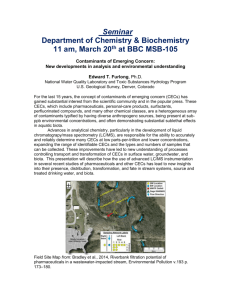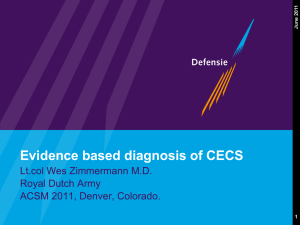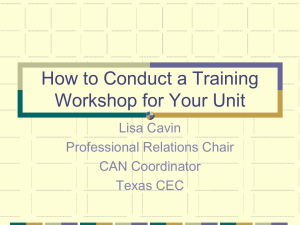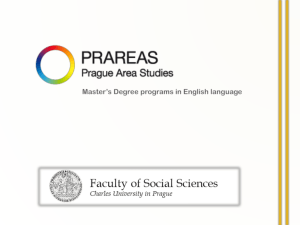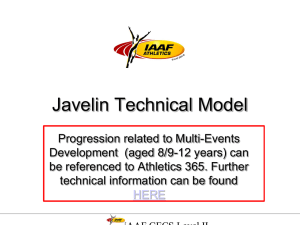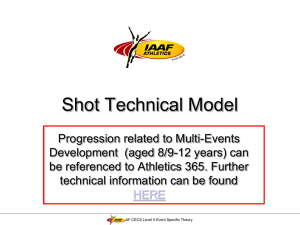BC CCDP Recertification Requirements & CEU Guidelines How to
advertisement
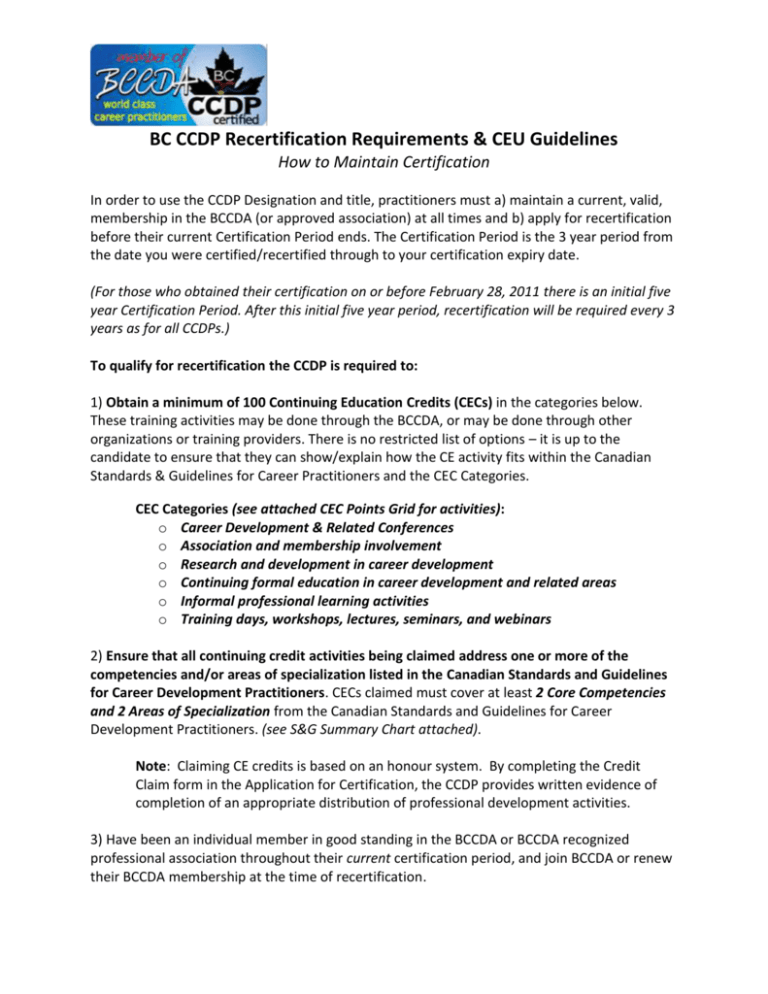
BC CCDP Recertification Requirements & CEU Guidelines How to Maintain Certification In order to use the CCDP Designation and title, practitioners must a) maintain a current, valid, membership in the BCCDA (or approved association) at all times and b) apply for recertification before their current Certification Period ends. The Certification Period is the 3 year period from the date you were certified/recertified through to your certification expiry date. (For those who obtained their certification on or before February 28, 2011 there is an initial five year Certification Period. After this initial five year period, recertification will be required every 3 years as for all CCDPs.) To qualify for recertification the CCDP is required to: 1) Obtain a minimum of 100 Continuing Education Credits (CECs) in the categories below. These training activities may be done through the BCCDA, or may be done through other organizations or training providers. There is no restricted list of options – it is up to the candidate to ensure that they can show/explain how the CE activity fits within the Canadian Standards & Guidelines for Career Practitioners and the CEC Categories. CEC Categories (see attached CEC Points Grid for activities): o Career Development & Related Conferences o Association and membership involvement o Research and development in career development o Continuing formal education in career development and related areas o Informal professional learning activities o Training days, workshops, lectures, seminars, and webinars 2) Ensure that all continuing credit activities being claimed address one or more of the competencies and/or areas of specialization listed in the Canadian Standards and Guidelines for Career Development Practitioners. CECs claimed must cover at least 2 Core Competencies and 2 Areas of Specialization from the Canadian Standards and Guidelines for Career Development Practitioners. (see S&G Summary Chart attached). Note: Claiming CE credits is based on an honour system. By completing the Credit Claim form in the Application for Certification, the CCDP provides written evidence of completion of an appropriate distribution of professional development activities. 3) Have been an individual member in good standing in the BCCDA or BCCDA recognized professional association throughout their current certification period, and join BCCDA or renew their BCCDA membership at the time of recertification. 4) Submit the Application for Recertification at least one month before the expiry date of your current certification period (this is a separate document where you can record a summary your CEU activities – but do not need to submit the supporting documents). 5) Applications are to be submitted by EMAIL as a PDF document - either saved as a PDF, or scanned as a PDF. Applications should be sent in no more than 60 days prior to the expiry of current certification. CEC Audit You must retain your supporting documentation proving the Continuing Education activities you are claiming for one year after your submission. (You will not submit these with your application but will keep them for possible audit at a later date). The Certification Review Committee will randomly select CCDP Applications for Recertification to verify documentation for continuing education credits/activities claimed as part of the application. As well, the review committee may special requests for supporting documents for claimed CECs to clarify eligibility. The BCCDA Registrar will email the candidate informing them they have been selected for audit, and backup documentation will be required to support their recertification process. Audited candidates must submit documents (hard or electronic copy) verifying Continuing Education activities within the timeframes, or for the activities specified by the Audit Committee. Acceptable CEU Activity Supporting Documents It is the responsibility of the applicant to record CE credits and retain proof for verification. Documentation will vary depending on the activity but for all claimed activities, the applicant is responsible for keeping documentation that verifies the following. o attendance or completion of activity o quantity of the activity (i.e. number of hours, number of meetings) o content/topic of the activity o name of the agency or institution that delivered the professional development activity o date(s) the applicant attended and/or completed the professional development activity Examples of accepted documentation include, but are not limited to the following: o receipts, o certificates of attendance, o transcripts, o CEU forms signed by presenters/instructors o conference agendas, o programs, o course outlines, o notes taken at conferences / workshops, summary or notes written by the CCDP about books/articles read, o clippings of CCDP published articles and letters of support and/or reference. Please keep your substantiating documentation for one year after submission. CEC Points Grid Note: The CEC grid below is meant to be used as a guideline. If an activity you’ve done varies from, or is not included in, the grid, use your discretion and claim what would be deemed equivalent or reasonable for the activity based on the CEC categories and points that are shown. CE Categories Maximum Credits from each category Activities/Credits Career Development and related* Conferences 100 Attendance at Career Development specific conferences (ex. BCCDA’s CDC, ASPECT, CANNEXUS) full day - 15 CECs per day per conference half day – 7 CECs per half-day per conference *As with other sections below, “related” activities/topics must be related closely to career development, the Canadian S&G’s, and/ or you’re your career development work. It is up to you to support how it relates to your CCDP work in the log in the recertification application where you claim the CECs. Association and membership involvement Attendance at a related conferences full day - 10 CECs per day per conference half day - 5 CECs per day per conference Speaking/presenting at a conference, per specific workshop 1-2hr wkshp – 8 CECs (first time, 3 CEC repeat) half day - 16 CEC (first time, 8 CEC repeat) full day – 24 CEC (first time, 12 CEC repeat) Volunteering time at a career development conference add full day - 8 CECs per day per conference half day - 4 CECs per day per conference 70 Career development association board role: 35 CECs per year Career development sector/association/regional committee: 24 CECs per year per committee 12 CECs per half year per committee Mentoring new career development practitioners into the field: 8 CECs per person per 3 months of formal mentoring Responding to career development association sponsored surveys: 2 CEC per survey Research, development and writing in career development 75 1st time design or development of a career development project or new course, workshop or program 1-2hr wkshp – 8 CECs half day - 16 CECs full day – 24 CECs Published writing in the career development field Book: 40 CECs per book Journal: 20 CECs per journal Article: 8 CECs per article Handout/Resource: 4 CECs each Newsletter or Career Development-related Blog Post: 3 CECs per newsletter or blog post Presentation or sit on panel at a National, Provincial or local career development forum 12 CECs per day per forum/ 6CECs per ½ day Career development research 1.5 CECs per hour up to 20 CECs CE Categories Continuing formal education in Career Development or directly related subjects at University, College (public/private), training institute, or recognized professional training body Informal learning activities Maximum Credits from each category 100 Activities/Credits Taking Courses: 1.75 CECs per instructional hour up to a max of 45 CECs for courses specific to career development 1.25 CEC per instructional hour up to a max of 40 CECs for other related courses Developing a new first-time University, College or formal training organization course: 2.25 CECs per instructional hour up to a max of 50 CECs for courses specific to career development 1.5 CEC per instructional hour up to a max of 40 CECs for other related courses 30 Read Book: 5 CECs per career development book read; 3 for related books Read Journal article: 3 CECs per career development journal article read; 2 per related article Participating in a sector Philosopher’s Café or Book Club 2 CECs per activity Participating in on-line activities related to career development (i.e. blogs or podcasts) 2 CECs per activity Informal on-the-job learning in a career/employment position: 4 CECs per 6 months Training days, workshops, lectures, seminars, and webinars 100 Attendance: Career Devel topic: 1 hour: 2 CECs 2 hours: 4 CECs Full day: 10 CECs per day Half day: 5 CECs per half day Other related: 1 CECs 2 CECs 6 CECs 3 CECs Attendance at Webinar (1-2 hours) – 4 CECs per career development webinar (2 for related) * see note below for training specific to new EPBC government Integrated Case Management (ICM) Database Speaking/presenting at a training day, workshop, lecture, seminar or webinar for CDP professionals: 1-2hr wkshp – 8 CECs (first time, 2 CEC repeat) half day - 16 CEC (first time, 4 CEC repeat) full day – 24 CEC (first time, 7 CEC repeat) Volunteering time at a career development event Full day: 6 CECs per event Half day: 3 CECs per event * Note: In early 2012, many practitioners received training for the new Case Management System introduced by the BC government as part of the new Employment Program of BC. This training varied in length from self-directed online, to one day, 3 day and 5 day. For this specific activity, as it does relate to two CCDP competencies (Case Management, and Technology Skills), it can be counted for the follow CECs: Self-directed learning or online modules only: 1.5 CECs per hour up to 10 CEC’s Per day of live training: 8 CEC’s per day up to a maximum of 35 CECs Sample of how CECs can add up: Category Career Development Conferences Career Development Conferences Association & Membership Involvement Research & Development in Career Development Continuing Formal Education in Career Development Informal Learning Activities Professional Development Activity CD Conference (2 day) Speak at a conference 2 hour workshop Committee member ½ year Design a career development workshop Informal Learning Activities Training Days, Workshops, Lectures & Seminars Completed one 7 hour course ‘related’ to career devel. Participate in a book club/ Philosopher’s Café and a 1 hour webinar Read a career development book Attend 2 Career Development Training Days (full day) Total CEC Hours Required = 100 Year 1 Credits 30 Year 2 Credits Year 3 Credits Total Credits 30 8 8 12 12 8 8 8.75 8.75 2 4 6 5 5 10 24 24 104.75 Canadian Standards and Guidelines for Career Development Practitioners The following are the Core and Specialization competencies at a glance. We recommend that you download a full summary chart here for ease of reference. http://career-devguidelines.org/career_dev/wp-content/uploads/2011/11/Doc-2-COMPETENCY-TABLES.pdf Canadian Standards & Guidelines Competency Category Chart Cluster Areas Functions Competencies Core C1. Professional Behaviour C1.1 Adhere to the Code of Ethics and the Ethical Decision-Making Model C1.1.1 Follow the code of ethics and apply the ethical decision-making model C1.2 Demonstrate a Commitment to Professional Development C1.2.1 Develop relationships with other professionals C1.3 Use Analytical Skills C1.3.1 Apply a solution-focused framework C1.4 Manage Work C1.4.1 Use planning and time management skills C1.1.2 Demonstrate professional attributes C1.2.2 Demonstrate a commitment to lifelong learning C1.2.3 Keep up-to-date with technology C1.3.2 Collect, analyze and use information C1.4.2 Follow case and project management procedures C1.4.3 Document client’s interactions and progress C1.4.4 Evaluate the service provided to clients Core (cont) C2. Interpersonal Competence C2.1 Respect Diversity C2.2 Communicate Effectively C2.3 Develop Productive Interactions with Clients C2.1.1 Recognize diversity C2.1.2 Respect diversity C2.2.1 Work with climate and context to enhance communication C2.2.2 Use a framework for verbal communication C2.2.3 Use a framework for written communication C2.2.4 Use effective listening skills C2.2.5 Clarify and provide feedback C2.2.6 Establish and maintain collaborative work relationships C2.3.1 Foster client self-reliance and selfmanagement C2.3.2 Deal with reluctant clients Core (cont) Core (cont) C3. Career Development Knowledge C4. Needs Assessment and Referral C3.1 Possess Career Development Knowledge C4.1 Refer Clients to the Appropriate Sources C3.1.1 Describe how human development models relate to career development C3.1.2 Describe major career development theories C3.1.3 Describe how change and transition affect clients moving through the career process C3.1.4 Describe how life roles and values impact career development C3.1.5 Identify major components of the career planning process. C3.1.6 Identify the major organizations resources and community-based services for career development C3.1.7 Explain components of labour market information C3.1.8 Keep current about the labour market C4.1.1 Respond to clients’ needs C4.1.2 Develop and maintain a referral network C4.1.3 Make appropriate referrals Areas of Specialization Assessment (i.e. guide client assessment, administer assessments to groups) Facilitated Individual and Group Learning (i.e. possess knowledge about how to facilitate learning, facilitate learning, facilitate groups) Career Counselling (i.e. possess knowledge in career counselling, demonstrate method of practice in interactions with clients, guide client in work search strategies, facilitate groups) Information and Resource Management (i.e. develop and maintain an information and resource base, provide clients with access to information, guide clients in work search strategies) Work Development (i.e. develop work opportunities for clients, guide clients in work search strategies) Community Capacity Building (i.e. promote community partnership and participation to increase self-sufficiency and enhance productivity, facilitate groups) Definitions CCDP Application for Recertification Form: This is the document you complete to apply for recertification. Canadian Standards and Guidelines for Career Development Practitioners: The BC CCDP designation was developed based on these standards/competencies which can be found in their entirety at http://career-dev-guidelines.org/career_dev/. CCDP’s applying for recertification must show how their professional development CECs have supported at least 2 core competency areas and 2 specialty areas. Certification Date: The date you first received your certification from the BCCDA. This date is printed on the certificate you received. Certification Period: A 3 year period during which you may use the CCDP designation/title from the date you are/were certified through to your certification expiry date (a five (5) year period for certifications issued on or before February 28, 2011). In order to continue using the CCDP designation/title applicants must be recertified for another 3 year period. Continuing Education (CE): Ongoing professional development, training or continuing education activities. This training and activities may be done through the BCCDA, or may be done through other organizations or training providers. There is no restricted list of options – it is up to the candidate to ensure that they can show/explain how the CE activity fits within the Canadian Standards & Guidelines for Career Practitioners and the CE Categories. Continuing Education Categories: The following categories are suitable for claiming Continuing Education Credits. More information can be found in Section 3 of this document. Career Development & Related Conferences Association and membership involvement Research and development in career development Continuing formal education in career development and related areas Informal professional learning activities Training days, workshops, lectures, seminars, and webinars Continuing Education Credits (CEC): These are credits awarded for a variety of professional development or continuing education activities. Expiry Date: This is the date upon which your credential expires. Recertification CEC Log Form: This is the log that you complete as part of the CCDP Recertification Application that shows all of your CEC activity during your certification period.
